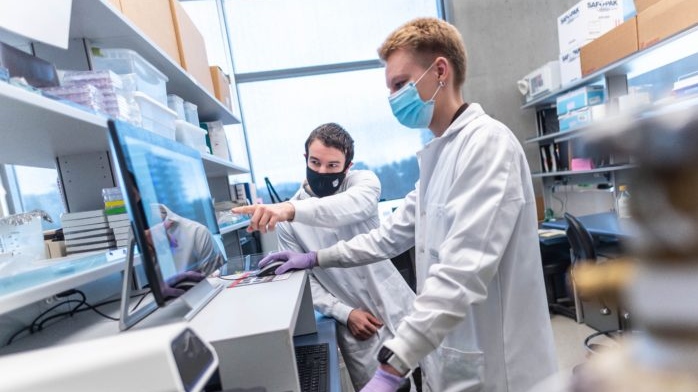Nasal spray could help prevent COVID-19 infection, UBC researchers say
 Connor Thompson, left, seen with researcher Annika Schulz, is co-author of a study on the use of a nasal spray for preventing and treating COVID-19 infection. (Credit: UBC/Paul Joseph)
Connor Thompson, left, seen with researcher Annika Schulz, is co-author of a study on the use of a nasal spray for preventing and treating COVID-19 infection. (Credit: UBC/Paul Joseph)
A nasal spray being developed by a team of scientists shows promise in preventing and treating COVID-19 infection, even as new variants of concern continue to emerge.
Research published Monday found the compound, called N-0385, significantly increased the likelihood of surviving the virus among mice.
Dr. Andrea Olmstead, a research associate with UBC’s department of microbiology and immunology, says the drug is different from the anti-virals currently available like Paxlovid and Remdesivir. While those drugs stop the spread of the virus, this one is meant to stop infection before it begins.
“It targets a human protein that the virus needs in order to get into our cells. I kind of think of it like a lock, it locks the door to the virus,” Olmstead said.
“It targets something in our nose, and in our lung cells that the virus needs to start the infection going. It would work really well as a preventative to block those doorways, block the virus from getting in and establishing infection.”
Although not yet approved for testing in humans, Olmstead says it is particularly promising because it has shown to be effective against all the variants it was tested on — up to and including the Delta variant.
“Despite the virus changing this compound continued to show efficacy. That's one of the rationales for moving forward is that the virus will continue to change,” she said.
The research is being published as the the BA.2 variant is fuelling a surge of infections in some countries, prompting concern that Canada could see another wave.
While Olmstead says vaccination remains critical, she also says preventative treatments like this one could bolster protection if and when efficacy wanes.
“The idea is, if you knew that you had been exposed, or if you knew you're going into a high risk environment – say you're a health-care worker and there was a new variant that we weren't sure if the vaccine was very protective against – then you could take something before you go to work and limit your chance of developing an infection,” she continued.
The research also suggests the compound can function as a COVID-19 treatment if used within 12 hours of infection. Mice treated with it showed lower levels of infection in their lungs, and did not experience as much virus-related weight loss.
CTVNews.ca Top Stories

Doctors ask Liberal government to reconsider capital gains tax change
The Canadian Medical Association is asking the federal government to reconsider its proposed changes to capital gains taxation, arguing it will affect doctors' retirement savings.
Keeping these exotic pets is 'cruel' and 'dangerous,' Canadian animal advocates say
Canadian pet owners are finding companionship beyond dogs and cats. Tigers, alligators, scorpions and tarantulas are among some of the exotic pets they are keeping in private homes, which pose risks to public safety and animal welfare, advocates say.
Prince William and wife Kate thank public for birthday messages for son Louis
Prince William and his wife Kate thanked the public for their messages which had been sent to mark the sixth birthday of their youngest son Louis on Tuesday.
She was the closest she'd ever been to meeting her biological father. Then life dealt her a blow
Anne Marie Cavner was the closest she'd ever been to meeting her biological father, but then life dealt her a blow. From an unexpected loss to a host of new relationships, a DNA test changed her life, and she doesn't regret a thing.
How quietly promised law changes in the 2024 federal budget could impact your day-to-day life
The 2024 federal budget released last week includes numerous big spending promises that have garnered headlines. But, tucked into the 416-page document are also series of smaller items, such as promising to amend the law regarding infant formula and to force banks to label government rebates, that you may have missed.
RCMP uncovers plot to sell drones and equipment to Libya
The RCMP says it has uncovered a ploy to sell Chinese drones and military equipment to Libya illegally.
Which foods have the most plastics? You may be surprised
'How much plastic will you have for dinner, sir? And you, ma'am?' While that may seem like a line from a satirical skit on Saturday Night Live, research is showing it's much too close to reality.
'Catch-and-kill' strategy to be a focus as testimony resumes in Trump hush money case
A veteran tabloid publisher was expected to return to the witness stand Tuesday in Donald Trump's historic hush money trial.
Quebec farmers have been protesting since December. Is anyone listening?
Upset about high interest rates, growing paperwork and heavy regulatory burdens, protesting farmers have become a familiar sight across Quebec since December.
































